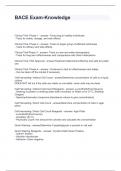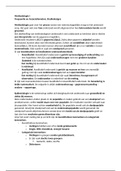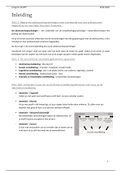6 A* AQA Sociology education essays
1. Functionalist role of education
2. Marxist role of education
3. Ethnicity different educational achievement
4. Gender differential educational achievement
5. Class differential educational achievement
6. Educational policies
, Evaluate the usefulness of functionalist view to our understanding of education in the UK
today (30)
Functionalism is a structuralist consensus theory which argues that all elements of society
work together in harmony to maintain stability and cohesion in society. The education
system is part of this as it teaches children the norms and values of society and prepares
them for the workforce. Despite producing a useful view of how the education system
works in the context of wider society, the failure to acknowledge social factors and their
impact on education means that this view is not overly useful to our understanding of the
education system as it only creates an idealised view of the role of education.
A crucial element of functionalist theory is that the education system creates a value
consensus where students are taught the norms and values of the society, they live in.
Durkheim argued that key school values are taught in lessons such as history and assembly
lead to social solidarity which is where individuals feel like part of a community through
having a national identity. School is a miniature society where students can learn the norms
and values through secondary socialisation. Durkheim sees this as a positive function of the
education system as it helps society to work together as everyone values the same things
and leads to a sense of unity amongst individual's which is necessary for a functioning
society. However, Marxists criticise this as the norms and values that are being transmitted
are not ones that represent the interests of everyone, but those of the ruling elite which
creates a ruling class ideology. Therefore, the education system reproduces social
inequalities through legitimising the existing social hierarchy. Additionally, feminists would
suggest that the norms and values taught in school are patriarchal which leads to the
further oppression of women. Therefore, the functionalist view cannot be said to be useful
as it has a rose-tinted view of the values taught in school whilst ignoring the various cultures
and beliefs of a society.
Furthermore, functionalists can hinder our understanding of the education system as they
view it as meritocratic however, inequalities amoungst social groups demonstrate that this
cannot be the case. Parsons suggests that everybody has an equal chance to achieve as
ability and hard work ultimately lead to success. With this, Davis and Moore argue that the
education system acts as role allocation to put the best people in the best jobs. There are
different exams and qualifications that students sit and through this, students are sifted into
the most appropriate roles. Whilst this may seem like an efficient way of role allocation, the
flawed system that favours the middle class, excluded some individuals from opportunities
meaning that this is not functioning. However, Marxists such as Bowles and Gintis suggest
that there is a myth of meritocracy as the class background of an individual determines how
well they will do because middle class students benefit from the material, social and cultural
capital which will help them to get into better schools and work. This maintains the
workforce needed by capitalism and perpetuates a cycle of inequality. Furthermore, the
functionalist view can be criticised as this does not account for the gender inequalities in
subject areas. Typically, women are socialised out of STEM subjects which have higher
market value meaning that women do not have an equal chance of success. Therefore, the
functionalist view is limited in its usefulness as it does not take into account the class,
gender and cultural differences which prevents the education system from being
meritocratic.
, Additionally, functionalists view the education system as a society in miniature which
prepares us for life beyond the family. Parsons suggests that in school we more from the
particularistic values of family life (values that are specific to an individual) into universalistic
values (values that are applied to everybody) of the workplace. This shift is seen as
necessary for a functioning society as creates cohesion if everybody has the same
expectations placed upon them. Functionalists view this as a positive aspect of the
education system as by instilling universal values such as punctuality, this contributes to a
functioning workplace. Whereas Marxist sociologists view the link between school and work
as negative as school is not simply preparing people for work but is preparing them for the
exploitation of capitalism. Therefore, functionalist theory is useful in examining the link
between school and the workplace, it does ignore the negative aspects of this.
Finally, school teaches specialist skills for work which have an economic need for society to
function. The diverse range of subject areas and vocational subjects which are adapted to
the labour needs mean that students are taught skills for the workplace. The alignment
between education and the labour market ensures a functioning and efficient workforce.
However, the value of apprenticeships as not seen as highly as academic routes and often
do not involve teaching the skills for that job. This perception can lead to an inconsistency
between the skills taught in school and ones needed for the job market. Furthermore, some
argue that the standardised testing of the education system means that students are not
prepared for work as they are “taught the test” though learning memorisation that
independent thought or creativity which limits students' ability to adapt to real world
situations. Therefore, the economic function of the education system is inherently flawed
and does not always match the needs of society.
Overall, the functionalist view of the education system provides us with a useful
understanding of secondary socialisation, the link between school and the workplace and
the economic function. However, functionalism fails to consider the factors of social class,
gender, the damaging nature of capitalism and the flawed system of teaching specialist
skills. This means that functionalism is not the most useful persepective when trying to
understand the education system as it is outdated and has an overly positive view.
Therefore, it is wrong to say that the functionalist view of the education system is useful.
1. Functionalist role of education
2. Marxist role of education
3. Ethnicity different educational achievement
4. Gender differential educational achievement
5. Class differential educational achievement
6. Educational policies
, Evaluate the usefulness of functionalist view to our understanding of education in the UK
today (30)
Functionalism is a structuralist consensus theory which argues that all elements of society
work together in harmony to maintain stability and cohesion in society. The education
system is part of this as it teaches children the norms and values of society and prepares
them for the workforce. Despite producing a useful view of how the education system
works in the context of wider society, the failure to acknowledge social factors and their
impact on education means that this view is not overly useful to our understanding of the
education system as it only creates an idealised view of the role of education.
A crucial element of functionalist theory is that the education system creates a value
consensus where students are taught the norms and values of the society, they live in.
Durkheim argued that key school values are taught in lessons such as history and assembly
lead to social solidarity which is where individuals feel like part of a community through
having a national identity. School is a miniature society where students can learn the norms
and values through secondary socialisation. Durkheim sees this as a positive function of the
education system as it helps society to work together as everyone values the same things
and leads to a sense of unity amongst individual's which is necessary for a functioning
society. However, Marxists criticise this as the norms and values that are being transmitted
are not ones that represent the interests of everyone, but those of the ruling elite which
creates a ruling class ideology. Therefore, the education system reproduces social
inequalities through legitimising the existing social hierarchy. Additionally, feminists would
suggest that the norms and values taught in school are patriarchal which leads to the
further oppression of women. Therefore, the functionalist view cannot be said to be useful
as it has a rose-tinted view of the values taught in school whilst ignoring the various cultures
and beliefs of a society.
Furthermore, functionalists can hinder our understanding of the education system as they
view it as meritocratic however, inequalities amoungst social groups demonstrate that this
cannot be the case. Parsons suggests that everybody has an equal chance to achieve as
ability and hard work ultimately lead to success. With this, Davis and Moore argue that the
education system acts as role allocation to put the best people in the best jobs. There are
different exams and qualifications that students sit and through this, students are sifted into
the most appropriate roles. Whilst this may seem like an efficient way of role allocation, the
flawed system that favours the middle class, excluded some individuals from opportunities
meaning that this is not functioning. However, Marxists such as Bowles and Gintis suggest
that there is a myth of meritocracy as the class background of an individual determines how
well they will do because middle class students benefit from the material, social and cultural
capital which will help them to get into better schools and work. This maintains the
workforce needed by capitalism and perpetuates a cycle of inequality. Furthermore, the
functionalist view can be criticised as this does not account for the gender inequalities in
subject areas. Typically, women are socialised out of STEM subjects which have higher
market value meaning that women do not have an equal chance of success. Therefore, the
functionalist view is limited in its usefulness as it does not take into account the class,
gender and cultural differences which prevents the education system from being
meritocratic.
, Additionally, functionalists view the education system as a society in miniature which
prepares us for life beyond the family. Parsons suggests that in school we more from the
particularistic values of family life (values that are specific to an individual) into universalistic
values (values that are applied to everybody) of the workplace. This shift is seen as
necessary for a functioning society as creates cohesion if everybody has the same
expectations placed upon them. Functionalists view this as a positive aspect of the
education system as by instilling universal values such as punctuality, this contributes to a
functioning workplace. Whereas Marxist sociologists view the link between school and work
as negative as school is not simply preparing people for work but is preparing them for the
exploitation of capitalism. Therefore, functionalist theory is useful in examining the link
between school and the workplace, it does ignore the negative aspects of this.
Finally, school teaches specialist skills for work which have an economic need for society to
function. The diverse range of subject areas and vocational subjects which are adapted to
the labour needs mean that students are taught skills for the workplace. The alignment
between education and the labour market ensures a functioning and efficient workforce.
However, the value of apprenticeships as not seen as highly as academic routes and often
do not involve teaching the skills for that job. This perception can lead to an inconsistency
between the skills taught in school and ones needed for the job market. Furthermore, some
argue that the standardised testing of the education system means that students are not
prepared for work as they are “taught the test” though learning memorisation that
independent thought or creativity which limits students' ability to adapt to real world
situations. Therefore, the economic function of the education system is inherently flawed
and does not always match the needs of society.
Overall, the functionalist view of the education system provides us with a useful
understanding of secondary socialisation, the link between school and the workplace and
the economic function. However, functionalism fails to consider the factors of social class,
gender, the damaging nature of capitalism and the flawed system of teaching specialist
skills. This means that functionalism is not the most useful persepective when trying to
understand the education system as it is outdated and has an overly positive view.
Therefore, it is wrong to say that the functionalist view of the education system is useful.










